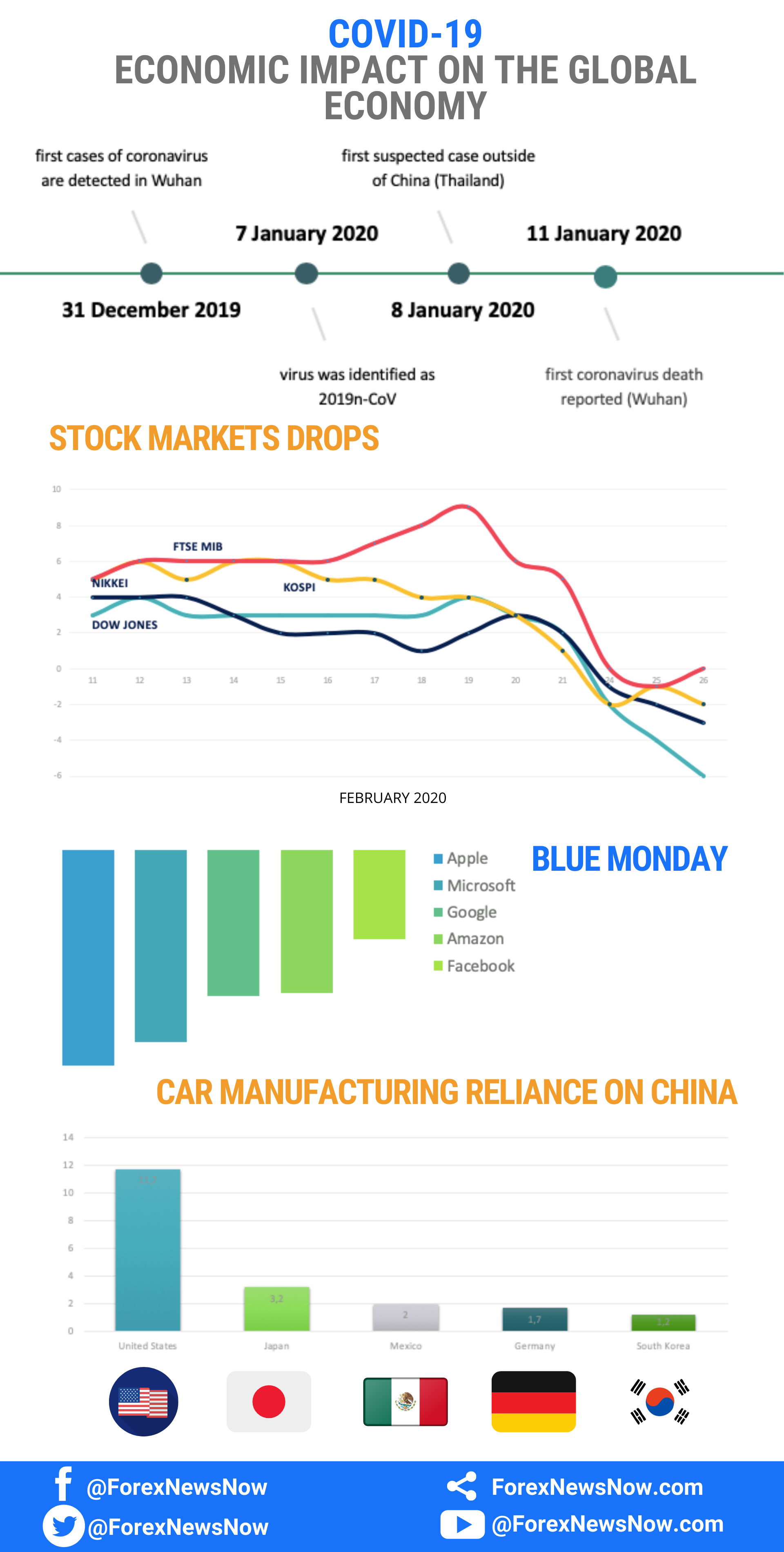Infographics: 2019n-CoV impact on the global economy

It has already been a couple of months since the coronavirus outbreak started to seriously affect all aspects of daily life. Apart from many deaths from the virus and appearance of new cases all over the world, experts are seriously concerned about the economic impact of it. Many may already observe that the economic system of China experiences a severe breakdown. However, that is not it. Economies of the world’s most developed countries have been going through the same ever since the end of December 2019, when the first possible case of coronavirus was detected.

Stock markets around the world were shaken by the outbreak of coronavirus. Many state that the same happened back in 2003 during the SARS outbreak in China. Last Wednesday, on February 26th, the Dow closed 4.91 percent lower than on February 3, which, in turn, was already 6.46% lower than on January 2.
It was also confirmed that it was the sharpest one-day drop in the last decade on the last Monday. Together with the Brexit referendum, the Yuan devaluations of 2015 and 2018’s Volmageddon, 2019n-CoV resulted in the worldwide index losing almost 3%.
Meanwhile, in South Korea, where there are already more than 1,700 cases officially recorded, the Kospi index closed almost 2 percent lower last Wednesday than on February 3. Also, Italy’s – the country with the third-most cases – FTSE MIB experienced a loss of 5% in a single day, meaning that all the gains made since February 3rd were lost completely.
At the same time, in Japan, which still keeps quarantined cruise ship, Diamond Princess, just off the country’s coast, the Nikkei index closing price on Wednesday was 2.38% lower than those of early February.
Without any doubt, American tech and e-commerce companies got affected the most. Among the companies that were affected the most by the Monday sell-off were Apple, Amazon, Microsoft, Facebook, and Google-parent Alphabet. Last Monday, stocks around the world plummeted amid rising concerns of the COVID-19 outbreak turning into a full-fledged pandemic.
The so-called GAFAM group of tech giants collectively lost in market capitalization that Monday. Each of the members of the group experienced a 4% drop in their prices. While it might be seen that all these companies got severely affected, the majority of experts agree that Apple is by far the most subjected to the effects of coronavirus outbreak. Not only China produces the majority of all parts necessary for manufacturing, but it also accounts for the largest share of the company’s revenue.
It goes without saying, that American companies are both the only ones affected. Considering the fact that Wuhan is the “China’s Motor City”, it can be stated for sure is that car manufacturing was exposed to the negative impact of coronavirus the most. Due to China’s role in the global economy, the supply chains of many countries were seriously disrupted. Among other industries that experienced slowdowns in production are electronics and chemicals.
Mike Dunne, an industry consultant formerly heading GM’s operations in Indonesia, commented on this issue:
“It only takes one missing part to stop a line.”
And that pretty much summarises the situation around the world. Namely, Fiat Chrysler Automobiles (FCA) confirmed that it will transfer its production at a plant in Kragujevac, Serbia because there is a deficit of parts that were used to come from China. Meanwhile, Hyundai and Renault have done the same, but in South Korea instead of Serbia.
According to the UN’s Comtrade database, there were accessories worth $34.8 billion exported from China to other countries in 2018. As it might be seen on the chart, America is definitely the first in the list of countries whose car manufacturing industry was damaged.
It can be noted that the significance of the impact of the epidemic on the global car industry depends directly on how quickly the flow of components from Chinese suppliers can return to the required level. However, while international automakers are gradually reopening factories across the country, the factories that were located in or close to Wuhan remain shut for an undefined period of time.


























Comments (0 comment(s))